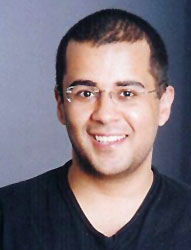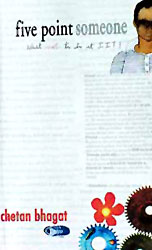 Five point someone-what not to do at IIT is a marvelous book by Chetan Bhagat. The title aptly describes the meaning that the book includes every point what should do in an institute like IIT and what should not but in a very polite and humorous way.
Five point someone-what not to do at IIT is a marvelous book by Chetan Bhagat. The title aptly describes the meaning that the book includes every point what should do in an institute like IIT and what should not but in a very polite and humorous way.
Born on 22nd April 1974, Chetan Bhagat is an author of two consecutive best sellers. He studied at Delhi in Army Public School and graduated from IIT Delhi. He finished his post-graduate studies from IIM Ahmedabad where he received an award as `best outgoing student award`. Since 1999 he has been working in an investment bank named Goldman Sachs in Hong Kong. His first novel was `Five points someone (FPS)`. This came out in 2004. It was bestseller for over seventy years after the release of the book. Chetan Bhagat has also won the Society Young Achiver`s award for his FPS in 2004 and in 2005 he got the publisher`s recognition award. His all creations are heartwarming. They are fast paced tale of three IITians that has got huge popularity.
Synopsis:
 Five point someone-what not to do at IIT by Chetan Bhagat is a story about three friends in IIT who are unable to cope. The book starts with a disclaimer, "This is not a book to teach you how to get into IIT or even how to live in college. In fact, it describes how screwed up things can get if you don`t think straight." The story is very interesting in the way that three hostel mates namely Alok, Hari and Ryan get off to a bad start in IIT they messed up the first class grades. It`s sometimes hilarious to read how these 3 boys spend their 4 years inside the high walls of the Indian Institute of Technology. Alok is having his family problems, Hari is somewhat a looser and Ryan is a flamboyant personality. In spite of their varied personality they share a unique friendship and always spend their time in doing naughty things except studying. Hari has lot to share about the ragging period and many other incidents in the college. There are many happy and sad moments, which are narrated in an excellent ways. They are just amazing. They always do what they want like listening to Pink Floyd, smoking grass and even drinking vodka prior to the vivas. Whatever they do ultimately they end up in the problem that is the actual comedy. Sometimes Alok wants to study but the other two don`t allow him to do so. Hari gets drunk before the viva and somehow manages to get caught by the professor. He also falls in love with the same professor`s daughter. All of a sudden they decide to improve their grades but as they were against to hard work in actual sense they decides to steal the papers for the exams. They eventually they were caught. To hide from the shame Alok decides to commit suicide but he can`t do so. Ultimate prof. Veera helps them and they end up in doing extra assignments and labour. At the end author add some sweetness to the story as he narrated that Alok and Hari gets employed and Ryan begins his research on his much loved subject Fluid Mechanism.
Five point someone-what not to do at IIT by Chetan Bhagat is a story about three friends in IIT who are unable to cope. The book starts with a disclaimer, "This is not a book to teach you how to get into IIT or even how to live in college. In fact, it describes how screwed up things can get if you don`t think straight." The story is very interesting in the way that three hostel mates namely Alok, Hari and Ryan get off to a bad start in IIT they messed up the first class grades. It`s sometimes hilarious to read how these 3 boys spend their 4 years inside the high walls of the Indian Institute of Technology. Alok is having his family problems, Hari is somewhat a looser and Ryan is a flamboyant personality. In spite of their varied personality they share a unique friendship and always spend their time in doing naughty things except studying. Hari has lot to share about the ragging period and many other incidents in the college. There are many happy and sad moments, which are narrated in an excellent ways. They are just amazing. They always do what they want like listening to Pink Floyd, smoking grass and even drinking vodka prior to the vivas. Whatever they do ultimately they end up in the problem that is the actual comedy. Sometimes Alok wants to study but the other two don`t allow him to do so. Hari gets drunk before the viva and somehow manages to get caught by the professor. He also falls in love with the same professor`s daughter. All of a sudden they decide to improve their grades but as they were against to hard work in actual sense they decides to steal the papers for the exams. They eventually they were caught. To hide from the shame Alok decides to commit suicide but he can`t do so. Ultimate prof. Veera helps them and they end up in doing extra assignments and labour. At the end author add some sweetness to the story as he narrated that Alok and Hari gets employed and Ryan begins his research on his much loved subject Fluid Mechanism.
Five point someone-what not to do at IIT by Chetan Bhagat is a story published by Rupa and Co. in the year of 2004.
The novel Five point someone-what not to do at IIT is a book with excellence. It was the best seller as well. The characters of this story is depicted in a nice way, it also provides a glimpse of college campus life very accurately. The author expresses a wicked sense of humor all through the book.













